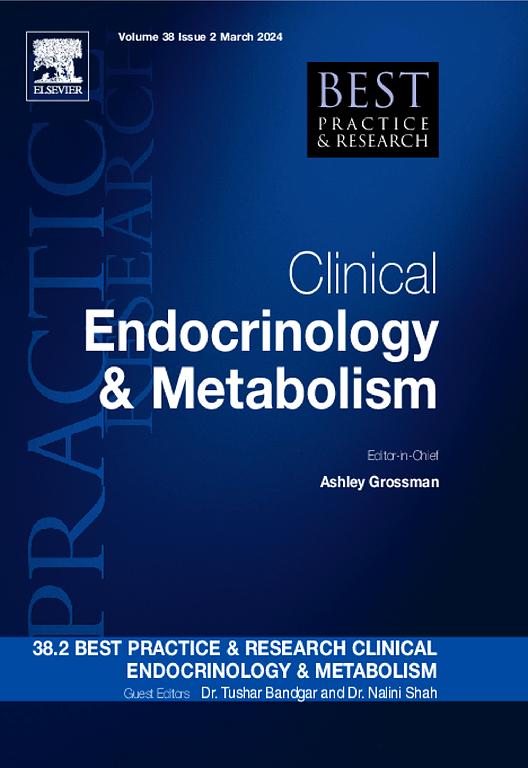外伤性脑损伤患者神经内分泌异常的病理生理学及诊断
IF 6.1
1区 医学
Q1 ENDOCRINOLOGY & METABOLISM
Best practice & research. Clinical endocrinology & metabolism
Pub Date : 2025-05-01
DOI:10.1016/j.beem.2025.102020
引用次数: 0
摘要
创伤性脑损伤(TBI)后可能出现的临床并发症之一是创伤后垂体功能低下。严重的创伤性脑损伤不仅在急性期,而且在长期内可破坏下丘脑-垂体-外周激素轴,可能导致持续的垂体功能障碍。急性危重症及其治疗可通过改变代谢、激素结合和激素产生改变下丘脑-垂体轴的正常适应性反应。在创伤性脑损伤的情况下,结构性脑损伤可能通过直接破坏下丘脑-垂体的解剖完整性而进一步损害下丘脑-垂体功能。诊断脑外伤后急性期垂体激素失衡具有挑战性,其临床意义仍有争议。然而,如果不及时治疗,肾上腺功能不全和ADH缺乏症会造成危及生命的危险,需要及时干预。本文提供了如何识别、避免和管理脑外伤患者垂体功能减退症的过度诊断和诊断不足的实用要点。本文章由计算机程序翻译,如有差异,请以英文原文为准。
Pathophysiology and diagnosis of neuroendocrine abnormalities in patients with traumatic brain injury
One of the possible clinical complications following traumatic brain injury (TBI) is post-traumatic hypopituitarism. Severe TBI can disrupt the hypothalamus-pituitary-peripheral hormone axes, not only in the acute phase but also over the long term, potentially resulting in persistent pituitary dysfunction. Acute critical illness and its management can alter the normal adaptive response of the hypothalamus-pituitary axis through changes in metabolism, hormone binding, and hormone production. In the context of TBI, structural brain damage may further impair hypothalamus-pituitary function by directly disrupting its anatomical integrity. Diagnosing pituitary hormone imbalances in the acute phase after TBI is challenging, and the clinical significance remains debatable. However, adrenal insufficiency and ADH deficiency poses a life-threatening risk if left untreated and requires prompt intervention. Practical points are provided on how to recognize, avoid, and manage both over- and underdiagnosis of hypopituitarism in patients with TBI.
求助全文
通过发布文献求助,成功后即可免费获取论文全文。
去求助
来源期刊
CiteScore
11.90
自引率
0.00%
发文量
77
审稿时长
6-12 weeks
期刊介绍:
Best Practice & Research Clinical Endocrinology & Metabolism is a serial publication that integrates the latest original research findings into evidence-based review articles. These articles aim to address key clinical issues related to diagnosis, treatment, and patient management.
Each issue adopts a problem-oriented approach, focusing on key questions and clearly outlining what is known while identifying areas for future research. Practical management strategies are described to facilitate application to individual patients. The series targets physicians in practice or training.

 求助内容:
求助内容: 应助结果提醒方式:
应助结果提醒方式:


